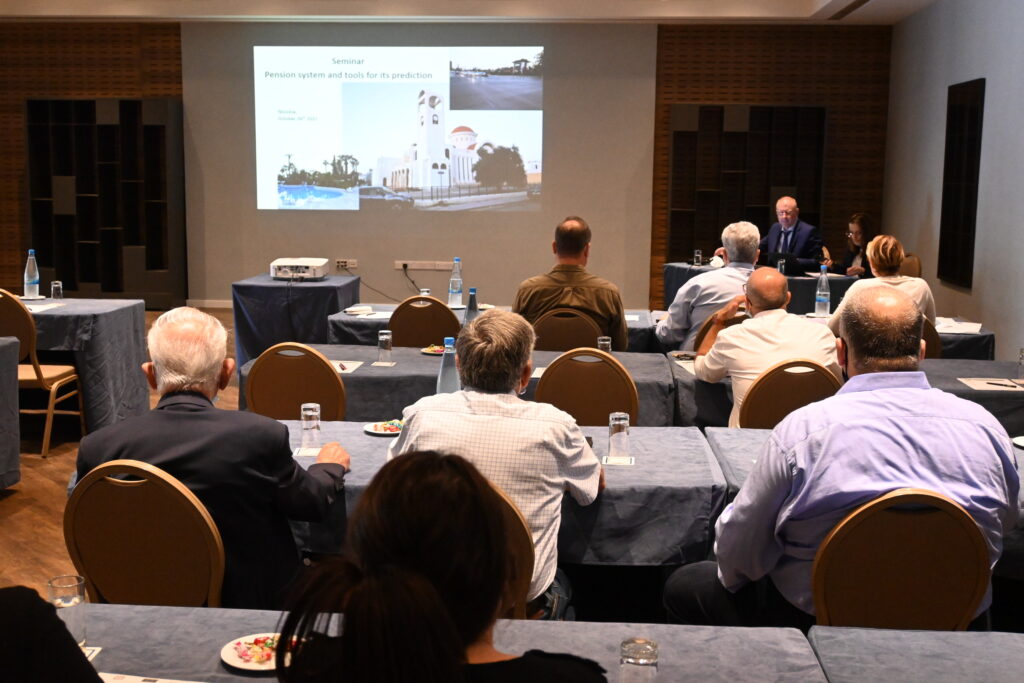Dne 26. 10. 2021 se v rámci projektu VS/2018/0380 Rozvoj mikrosimulačních nástrojů pro projekce sociálního pojištění (DEMTOP) uskutečnil první odborný seminář. Místem konání byl Kypr, hlavní město Nikósie. Organizátorem semináře bylo Ministerstvo práce a sociálních věcí České republiky s podporou nadačního fondu ERUDICIO. Realizace semináře byla podporována Ministerstvem práce, sociálního zabezpečení a sociálního pojištění Kyperské republiky. V neposlední řadě byla podpora a aktivní součinnost poskytnuta velvyslanectvím České republiky v Nikósii.
Tématem semináře bylo poskytnutí informace o samotném projektu DEMTOP, jeho cílech a výstupech, zejména pak detailní představení penzijního dynamického mikrosimulačního modelu využívaného pro projekce – NEMO. Vzhledem k tomu, že se jednalo o vysoce expertní seminář, zcela zásadní bylo složení účastníků semináře a související návazná diskuse a zpětná vazba účastníků.
Celkem se semináře účastnilo 23 osob včetně tajemníka velvyslanectví České republiky v Nikósii pana Davida Hrdouška a ředitelky odboru služeb sociálního pojištění Ministerstva práce, sociálního zabezpečení a sociálního pojištění Kyperské republiky paní Evangelia Georgiadou, která seminář zahájila a přivítala účastníků semináře. Dalšími účastníky semináře pak byli zástupci Úřadu pro sociální pojištění, zástupce kyperské Obchodní a průmyslové komory, Federace zaměstnavatelů a podnikatelů Kyperské republiky, Konfederace zaměstnanců Kyperské republiky, Unie státních zaměstnanců Kyperské republiky, Ministerstva práce, sociálního zabezpečení a sociálního pojištění Kyperské republiky a poradci ministra pro problematiku sociálního zabezpečení.
V úvodu semináře byli účastnící seznámeni se základní myšlenkou projektu a se schématem a hlavními rysy českého penzijního systému, včetně prezentace jeho základních pilířů, typů jednotlivých dávek a jejich charakteristikou a zejména pak s konstrukcí starobního důchodu.
Další prezentace se zaměřovala, jak již bylo výše zmíněno, na samotný model využívaný pro projekce – český dynamický mikrosimulační model – NEMO. V rámci prezentace byl tento systém detailně představen, pozornost byla věnována datové základně, využívané pro NEMO a nastavení indikátorů pro zpracování analýz.
Závěrečná prezentace se zaměřovala na výsledky projektu – analýzu data multikriteriální model rozhodování. Významná část prezentace se zaměřovala na přiblížení dostupných dat – mikrodat pro platby důchodů, mikrodat souvisejících se mzdovou a pracovní historií, nemocností, návazných dávek atp. Podrobněji byly přiblížení podmínky významné pro přijetí rozhodnutí o přechodu do penze či možnosti kombinace starobního důchodu a práce. Zmíněny byly také životní situace souvisejí s péčí o člena rodiny a dále analýza pro modelování mezd.
V rámci každého příspěvku probíhala diskuse a byl vytvořen prostor pro zpětnou vazbu účastníků a případné sdílení místní praxe a přístupů.
On 26 October 2021, the first expert seminar was held within the project VS/2018/0380 Development of microsimulation tools for social insurance projections (DEMTOP). The venue was Nicosia, the capital of Cyprus. The seminar was organised by the Ministry of Labour and Social Affairs of the Czech Republic with the support of the ERUDICIO Foundation. The implementation of the seminar was supported by the Ministry of Labour, Welfare and Social Insurance of the Republic of Cyprus. Last but not least, support and active cooperation was provided by the Embassy of the Czech Republic in Nicosia.
The theme of the seminar was to provide information on the DEMTOP project itself, its objectives and outcomes, in particular a detailed presentation of the pension dynamic microsimulation model used for the projections – NEMO. As this was a highly expert seminar, the composition of the seminar participants and the related follow-up discussion and feedback from the participants was quite crucial.
In total, 23 people attended the workshop. The Deputy Director of the Embassy of the Czech Republic in Nicosia, Mr. David Hrdoušek and the Director of the Social Insurance Services Department of the Ministry of Labour, Welfare and Social Insurance of the Republic of Cyprus, Ms. Evangelia Georgiadou, provided the official opening and welcoming of the seminar participants. Other participants in the seminar included representatives of the Social Insurance Office, representatives of the Cyprus Chamber of Commerce and Industry, the Federation of Employers and Industrialists of the Republic of Cyprus, the Confederation of Employees of the Republic of Cyprus, Democratic Workers´ Federation of Cyprus, the Union of Civil Servants of the Republic of Cyprus, the Ministry of Labour, Welfare and Social Insurance of the Republic of Cyprus and advisors to the Minister on social security issues.
At the beginning of the seminar, the participants were introduced to the basic idea of the project and to the scheme and main features of the Czech pension system, including a presentation of its basic pillars, the types of individual benefits and their characteristics and, in particular, the design of the old-age pension.
Another presentation focused, as mentioned above, on the model used for the projections – the Czech Dynamic Microsimulation Model – NEMO. This system was presented in detail, attention was paid to the data base used for NEMO and the setting of indicators for the analysis. Presentation of the dynamic microsimulation model here.
The final presentation focused on the results of the project – data analysis of the multicriteria decision-making model. A significant part of the presentation was focused on zooming in on the available data – microdata for pension in payment, microdata related to earnings and work history, sickness insurance, relation to other social benefits, etc. The conditions relevant to do the decision to retire or the possibility of combining retirement and work were presented in more detail. Life situations related to caring for a family member were also mentioned, as well as analysis for wage modelling.
Within each presentation there was discussion and space was created for feedback from participants and possible sharing of local practices and approaches.
